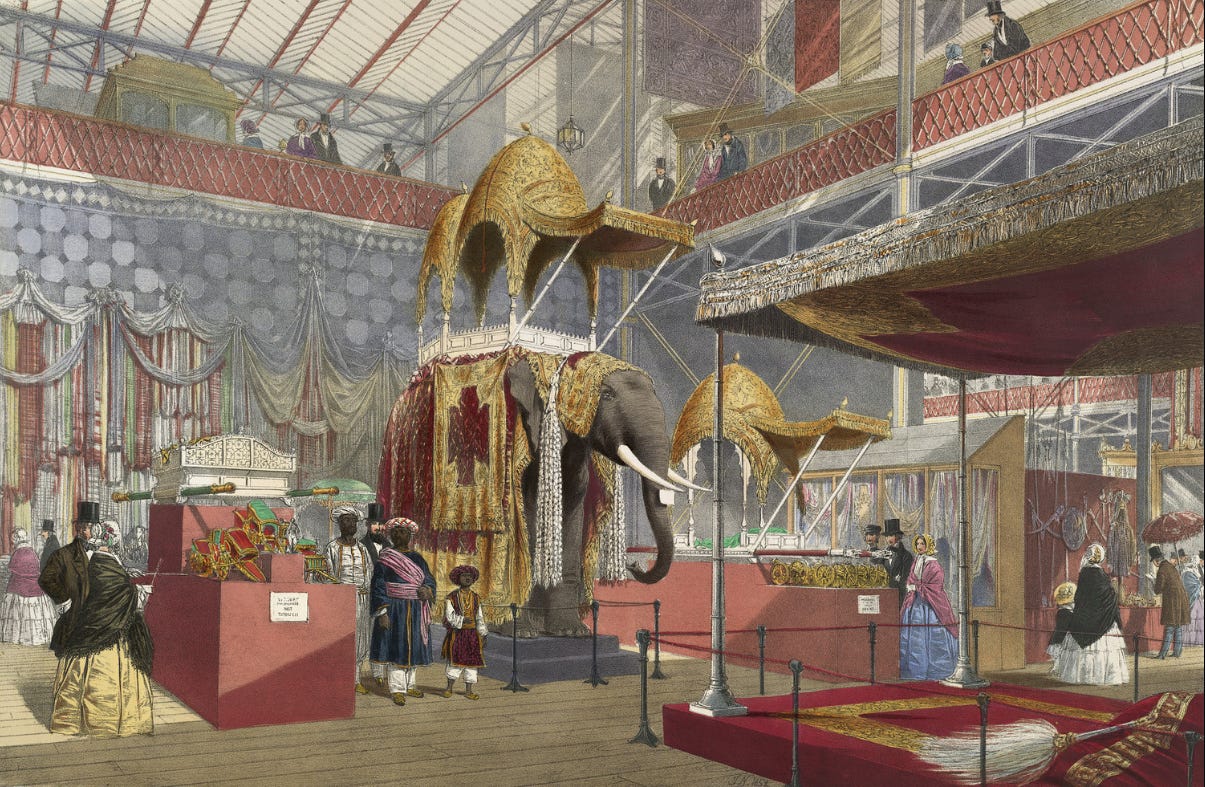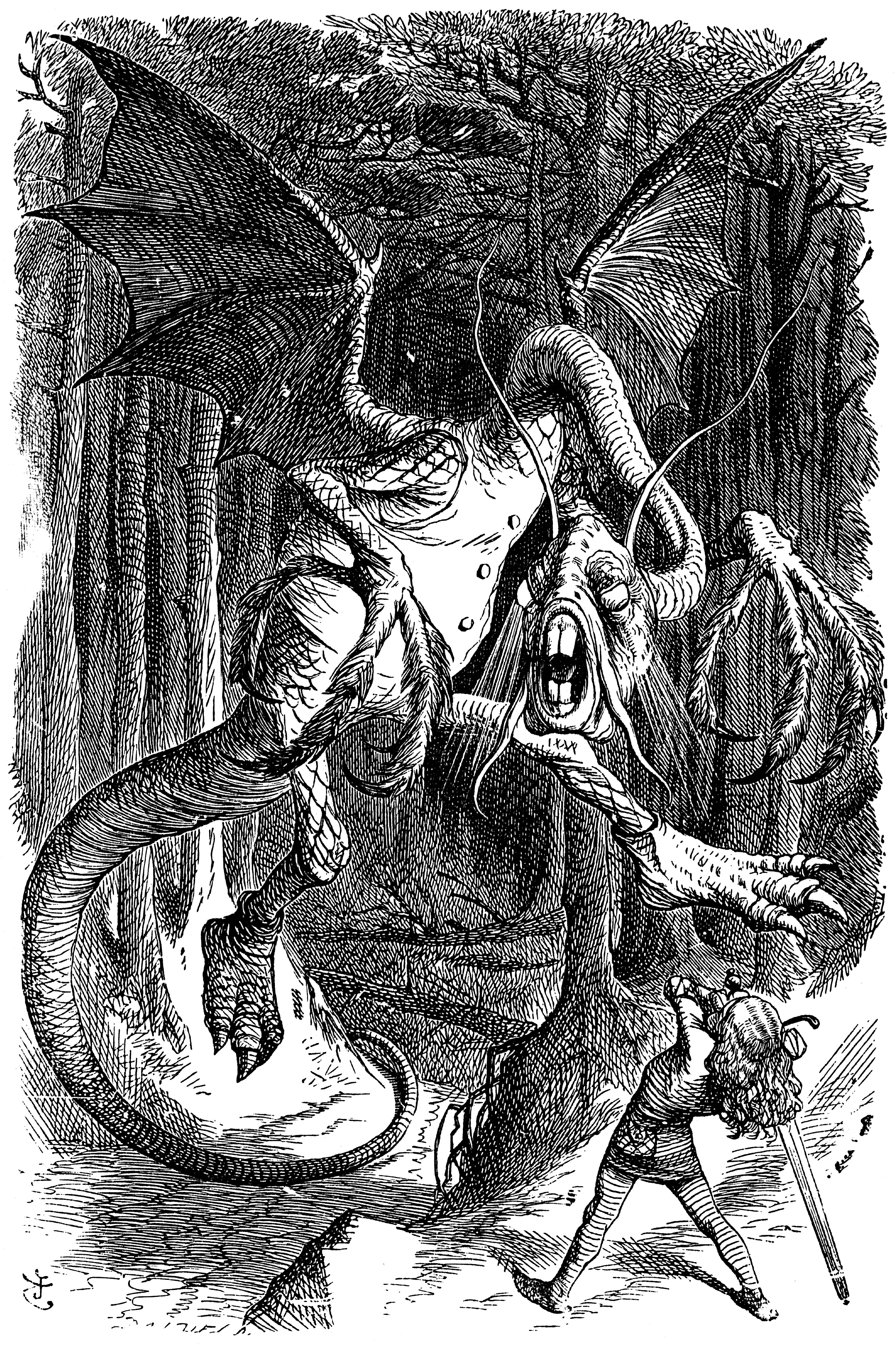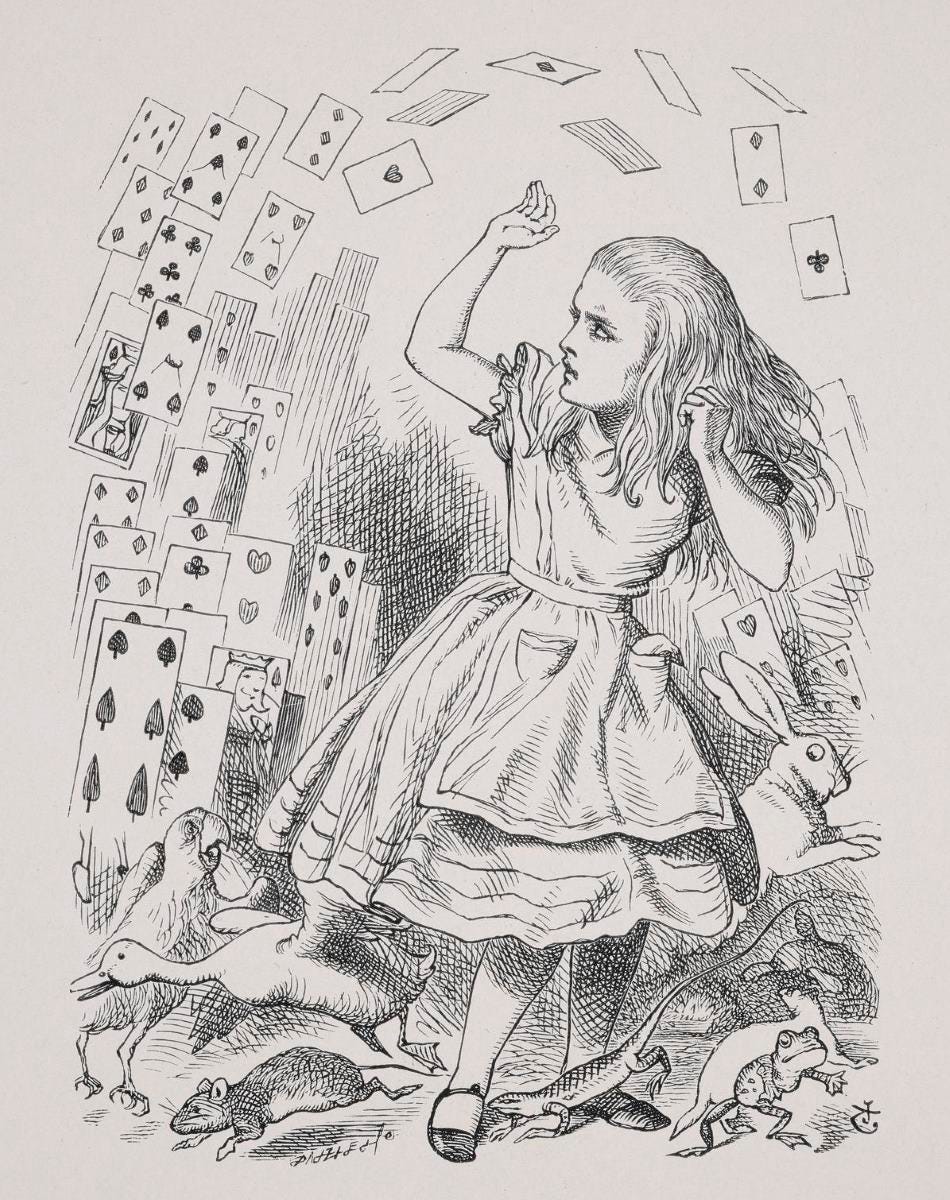This post is for paying subscribers. You can still get 20% if you sign up today. The offer ends tomorrow!
Finding Wonderland
Is Alice’s Adventures in Wonderland pure whimsy or does it mean something? Theories of all stripes have been imposed on Carroll’s story: Freudian, religious, Darwinian, psychological, biographical. Alice has variously been claimed as a repressed Freudian adventure into Carroll’s love of little girls, parodied as an allegory of religious history, claimed as a model of evolution, explained as being a novel about consciousness, and shown as a series of in-jokes, devised specifically for the first children he told the story to. All of these ideas are true to some degree, but the real answer is subtle and kaleidoscopic.
Some people believe that the value of a great book is its ability to wear so many interpretations. But that belief can lead us into idle speculation where a lot is said and only a little is learned. Instead, let’s look at what we know about Carroll and his book to understand how it works. (His real name was Dodgson, but I’ll use Carroll to keep it simple.) Carroll came of age in the great age of Victorian invention, and Alice reflects the great variations and unexpected innovations of its time.
Carroll was of a younger generation than many famous Victorian authors. Born in 1832, he is the next generation on from Dickens, Mill, and the Brontes. They were born in the Napoleonic era. Carroll was raised in a much more Victorian world. His early life was spent in isolation, living in his father’s remote parish, before he had four miserable years at boarding school. He matriculated at Oxford in 1851, the year of the Great Exhibition.
Carroll was a lover of games and gadgets. His uncle Skeffington had telescopes, microscopes, pocket measuring devices, cameras, which fascinated the young Carroll. In the same spirit he was enthralled by the Great Exhibition, calling it a “fairyland”. Perhaps he saw the bathtub you could rock to simulate the waves of the sea, or the machine that sent pictures along the telegraph system, or the alarm-clock bed that tipped you out if you didn’t wake up when the clock rang. There is something zany, something Wonderland-esque, about the Great Exhibition.
There was more than fanciful inventions like the Tempest Prognosticator—every turn in the exhibition brought you onto some new exotica, some new wonder: a royal Indian elephant, indoor trees, tableaus of stuffed animals, a tooth extractor. The Exhibition also has Smith’s comic electrical telegraph, a creepy-looking mask that moved through the use of electrical rods, creating all sorts of grotesque facial expressions.
This sense of wonderment and the uncanny is clearly transposed on Alice. It’s not a “Great Exhibition novel” but it is a story that reflects the great preponderance of ideas and innovations of its times. Carroll was an inveterate collector of gadgets, children’s games and puzzles, but he was also a collector of ideas.
Thus theories like “Alice is an evolution novel”—because Alice has to adapt all the time, constantly risks death, and emerges from the pond of life—are too narrow, overlooking the intersection of the biographical and psychological as well. The descent to Wonderland might remind us of Carroll’s religious views. He disagreed with the concept of eternal damnation, and whatever risks she runs Alice never finds hell down there, only absurdity. The theme of survival is as much religious as it is Darwinian. Unlike many other children’s stories, Carroll is denying the moral, evolutionary or theological.
Wonderland can be a dark place, reflecting the stream of strange and inexplicable thoughts that populate all minds to some degree. The little niches she encounters reflect the way Carroll described memory as full of odd corners and shelves. This is also a book about consciousness—worrisome streams of thought were something Carroll seemed familiar with.
Above all, though, it is a game. All the resizing of Alice via cakes, bottles, and mushrooms reflects his interest in telescopes and microscopes. The books are full of chess, cards, croquet, word play. Carroll’s interest in parallel and mirroring are everywhere—as is his interest in spiritualism, seen in episodes like the vanishing of the Cheshire Cat. Many passages that seem like nonsense are simply playing with logical ideas. Above all, it is parodic. Carroll’s poems qualify him as one of the best parodic writers in English. Parodies, of course, are games: closed systems of rearrangement.
When tropes of evolution, spiritualism, dreams, and religion are used, it is in the same spirit: idea chess. This is a game that plays with ideas in the air, not merely a roman a clef or an allegory. It has its own strange internal rules, like a game, not amenable to real world application or explanation. The game only works because of its self-imposed bizarre constrictions.
Still, it is a very weird game. And the weirdness leads to much of the theorising. As John Bayley wrote in the NYRB:
Carroll, like Kafka, is not only unique but concerned with the phenomena of our general being and consciousness, not with the escape back to childhood, or with the fantasy creation of a parachildhood.
The error here is the “not”. It’s both. And more. This is demonstrated by the ease with which the same idea can be persuasively argued by the biographical theorists. To Morton Cohen, Carroll’s biographer, Alice was Carroll, with his combination of sharp retorts, ineptitudes, confusions, and insensitivities. Suddenly we can see this is an escape, a biographical portrait, and an examination of consciousness. As in a game like chess, the longer we play, the more patterns we find.
More perceptively, Cohen writes about Carroll’s other writing, some three hundred items, which include a book about Euclid:
In Euclid and his Modern Rivals (1879), engagingly built as a four-act comedy and a Platonic dialogue enhanced by Dodgson’s trump card, his whimsy, he presented a forceful argument against all who had meddled with Euclid’s text. From that point on esoteric work followed esoteric work, virtually always embellished by his hallmark, that characteristic Dodgsonian wit; even a century later, when professional mathematicians see a reference to some of the examples that Dodgson used to illustrate his arguments—for instance ‘What the tortoise said to Achilles’ or ‘The barber-shop paradox’—they chuckle.
This all reinforces the basic point: Carroll’s primary mode is the game: he can play in seriousness or he can play in nonsense, drawing on ideas that were in the air. But it is a mistake to find too much of him or what he believed in this book. There’s a good deal of spiritualism, but Carroll didn’t take spiritualism seriously until the 1880s. We know he was interested in Darwin, but not really what he thought of evolution. His religious views are more certain but still a little ambiguous.
The only sure thing we can say is that Wonderland is a game: a dark game, maybe a nasty one in its undertones, but not one we should interpret too finely. That would be to miss the point completely. The game is played by its own rules. As Robert Douglas Fairhurst said, “Alice’s dream grows by feeding on itself.”





